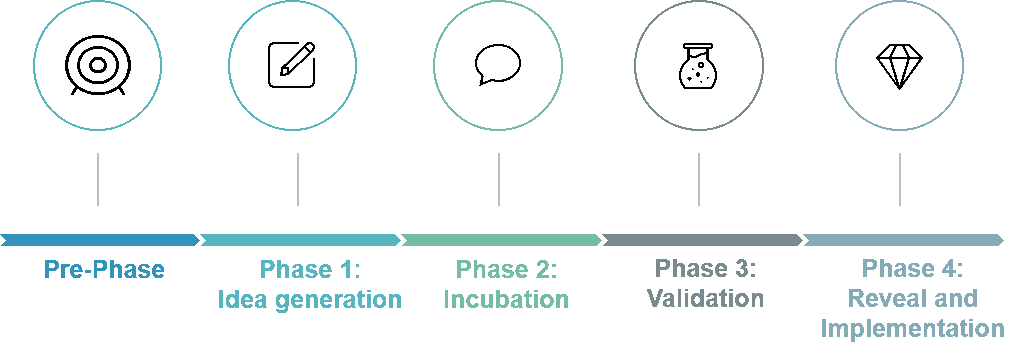
The application of Open Innovation in the public sector
Meret Clara Thomann
Short summary
The city of Friedrichshafen has launched an Open Innovation Initiative (OI) with the "mach mit!" platform. Five projects of the city administration have been published by the time the presented research paper was written. Citizens* can use this platform to submit their ideas and suggestions for working on municipal projects. The projects ranged from municipal budgets to urban planning measures and long-term urban development.
The aim of the work is to analyse the process of OI initiatives in a municipality using the case study Friedrichshafen as an example. One focus is on the reasons why the municipality decided to introduce the platform and what goals it is pursuing with it. It was not possible to conclusively investigate the achievement of the objectives, since at the time of the interviews none of the projects had already been completed. However, it was found that the interviewees from Friedrichshafen's local government evaluated the experience gained so far with the initiative very positively. Overall, the handling of open innovation was outlined as an area in which the local administration is in a constant learning process.
Embedding in the context
Context
Traditionally, administrative innovations are conceived in a closed model, e.g. predetermined by policies within the administration and without involving the citizens. In contrast to this, the concept of "open innovation" allows the knowledge and ideas of citizens and users to be used and integrated into the innovation process.
In the course of Administration 4.0, digitisation and Open Government, new possibilities are opening up and more and more areas of administration are testing the use of open innovation approaches. Planning should no longer take place behind closed doors, but the potential of the ideas and knowledge of citizens should be integrated. Here, the concepts of local knowledge and collective intelligence come into play. Ideally, different proposals are combined in the discourse of different actors and result in a better solution. The citizens are involved and can thus actively deal with problems of politics and administration in their direct living environment even outside of elections.
Methodology
Within the framework of a single case study, in this case the "mach mit!" platform of the municipality of Friedrichshafen, a total of five interviews were conducted. The interview partners were the central organisation unit of the project, which is located as a staff unit directly at the mayor's office, as well as the responsible unit of the commissioned IT and consulting company, which supported the project both technically and in terms of content. In addition, interviews were conducted with three employees or heads of department of the departments, covering all projects that were on the platform at the time of the research. The transcribed interview data were then evaluated in a qualitative content analysis according to Mayring, which works with category systems (Mayring & Fenzl, 2014). In this way, it was possible to reconstructively uncover structures and correlations of the statements (Bohnsack, 2014).
Results
The presentation of the results from the interviews follows the phase model for Open Innovation projects according to Mergel (2015). This offers the opportunity to clarify the procedural nature of such an initiative and to make it comprehensible step-by-step.
The pre-phase consists of the preparation of the project. It also defines the goals that the municipality is pursuing with the introduction of the internet platform. They can be divided into different categories. One category represents the participation, which consists of the normative requirement to include the needs and ideas of the citizens and establish a culture of participation.
Another goal is an improved relationship between politics, public administration and citizenship. Following this, administrative action should gain more credibility and transparency and at the same time increase citizens' understanding of the areas of tension the local administration is facing.
Another aim of the project is to make use of the citizens' knowledge. This can be achieved by removing the specialist lens of the public administration and incorporating the experience of the citizens with the effect of administrative measures. Citizens have everyday expertise that the administration cannot provide, therefore the aim is to see these new perspectives and make use of potentials. Another objective connected with the launch of the platform is the use of technical possibilities that enable a low-threshold contact and interaction between citizenship and administration. In this way, people who are unable to attend meetings and workshops can also be reached.
In the first phase the ideas of the citizens are collected. Depending on the concretization of the question and the content of the project, very different results can be achieved. The contributions are moderated on the platform and a duplicate recognition is used. At the end of the collection of ideas, a general overview is created.
In phase two, the proposed ideas will be evaluated on the platform, allowing interactions between citizens and the public administration. Depending on the content of the project, an individual decision is made as to which functions are permitted. The rating function allows voting, while the possibility to write comments facilitates an argumentative discussion of the ideas. The interview partners, however, raised the question of how representative the achieved results were, especially based on the voting on different ideas.
In the third phase, the ideas are evaluated internally in the public administration. Various actors are involved, for example project officers from the respective specialist departments or, if necessary, from the office management. In the case of particularly important political dimensions of the ideas, the mayor can also be called in. For this purpose, the ideas are sorted first and a process of evaluation based on legal requirements and feasibility is conducted. This leads to the formulation of statements and the ideas are then converted into local council drafts with public administrative recommendations (if necessary).
In the fourth and last phase, the ideas are implemented. Depending on the project, there are differences whether citizens’ ideas are incorporated directly into local council drafts, which are decided politically, or whether a multi-stage procedure is applied. This procedure can, for example, consist of incorporating the ideas in competitive bidding for urban development measures or subsequent workshops with planning offices and/or citizens. However, it is difficult to verify the implementation, as no project had been completed by that time.

Practical implications
Practical implications arise from the procedures that have been evaluated as successful in Friedrichshafen and could be promising also in other contexts. This includes the fact that clear goals have been set right from the start, which can be achieved with the platform These include, for example, the further involvement of citizens in administrative activities together with an increase in transparency or the targeted use of citizens' knowledge which is not available to the public administration itself. One prerequisite for the success of Open Innovation approaches is also the ability of organizations to be open to ideas and to work with them internally. To this end, administrative resources and capacities must be available to ensure the processing of citizens' contributions. The comment column was an enriching tool for the further development of ideas and concepts. An open approach in the evaluation of ideas and an answer from the administration to the individual contributions is considered particularly important for credibility and transparency.
In addition, the online procedure was partly supplemented by on-site workshops in order to create as many options as possible for participation and exchange of ideas with the citizens. At the same time, it is challenging to involve the citizens, but also to communicate that not all ideas can be equally considered and implemented.
Despite the promising results, it is important to bear in mind that a transfer of the procedures to other municipalities will not necessarily produce the same positively evaluated results – since there were already major differences between the projects in Friedrichshafen.
Files

Meret Clara Thomann
Meret Thomann completed her bachelor’s degree in Political and Administrative Sciences at the University of Constance in spring 2017. Since September 2018, she has been studying for a master’s degree in Management, Organizational Studies and Cultural Theory at the University of St. Gallen.
